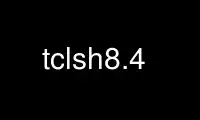
This is the command tclsh8.4 that can be run in the OnWorks free hosting provider using one of our multiple free online workstations such as Ubuntu Online, Fedora Online, Windows online emulator or MAC OS online emulator
PROGRAM:
NAME
tclsh - Simple shell containing Tcl interpreter
SYNOPSIS
tclsh ?fileName arg arg ...?
_________________________________________________________________
DESCRIPTION
Tclsh is a shell-like application that reads Tcl commands from its standard input or from
a file and evaluates them. If invoked with no arguments then it runs interactively,
reading Tcl commands from standard input and printing command results and error messages
to standard output. It runs until the exit command is invoked or until it reaches end-of-
file on its standard input. If there exists a file .tclshrc (or tclshrc.tcl on the
Windows platforms) in the home directory of the user, tclsh evaluates the file as a Tcl
script just before reading the first command from standard input.
SCRIPT FILES
If tclsh is invoked with arguments then the first argument is the name of a script file
and any additional arguments are made available to the script as variables (see below).
Instead of reading commands from standard input tclsh will read Tcl commands from the
named file; tclsh will exit when it reaches the end of the file. The end of the file may │
be marked either by the physical end of the medium, or by the character, '\032' ('\u001a', │
control-Z). If this character is present in the file, the tclsh application will read │
text up to but not including the character. An application that requires this character │
in the file may safely encode it as ``\032'', ``\x1a'', or ``\u001a''; or may generate it │
by use of commands such as format or binary. There is no automatic evaluation of .tclshrc
when the name of a script file is presented on the tclsh command line, but the script file
can always source it if desired.
If you create a Tcl script in a file whose first line is
#!/usr/local/bin/tclsh
then you can invoke the script file directly from your shell if you mark the file as
executable. This assumes that tclsh has been installed in the default location in
/usr/local/bin; if it's installed somewhere else then you'll have to modify the above
line to match. Many UNIX systems do not allow the #! line to exceed about 30 characters
in length, so be sure that the tclsh executable can be accessed with a short file name.
An even better approach is to start your script files with the following three lines:
#!/bin/sh
# the next line restarts using tclsh \
exec tclsh "$0" ${1+"$@"}
This approach has three advantages over the approach in the previous paragraph. First,
the location of the tclsh binary doesn't have to be hard-wired into the script: it can be
anywhere in your shell search path. Second, it gets around the 30-character file name
limit in the previous approach. Third, this approach will work even if tclsh is itself a
shell script (this is done on some systems in order to handle multiple architectures or
operating systems: the tclsh script selects one of several binaries to run). The three
lines cause both sh and tclsh to process the script, but the exec is only executed by sh.
sh processes the script first; it treats the second line as a comment and executes the
third line. The exec statement cause the shell to stop processing and instead to start up
tclsh to reprocess the entire script. When tclsh starts up, it treats all three lines as
comments, since the backslash at the end of the second line causes the third line to be
treated as part of the comment on the second line.
You should note that it is also common practise to install tclsh with its version number │
as part of the name. This has the advantage of allowing multiple versions of Tcl to exist │
on the same system at once, but also the disadvantage of making it harder to write scripts │
that start up uniformly across different versions of Tcl.
VARIABLES
Tclsh sets the following Tcl variables:
argc Contains a count of the number of arg arguments (0 if none), not including
the name of the script file.
argv Contains a Tcl list whose elements are the arg arguments, in order, or an
empty string if there are no arg arguments.
argv0 Contains fileName if it was specified. Otherwise, contains the name by
which tclsh was invoked.
tcl_interactive
Contains 1 if tclsh is running interactively (no fileName was specified and
standard input is a terminal-like device), 0 otherwise.
PROMPTS
When tclsh is invoked interactively it normally prompts for each command with ``% ''. You
can change the prompt by setting the variables tcl_prompt1 and tcl_prompt2. If variable
tcl_prompt1 exists then it must consist of a Tcl script to output a prompt; instead of
outputting a prompt tclsh will evaluate the script in tcl_prompt1. The variable
tcl_prompt2 is used in a similar way when a newline is typed but the current command isn't
yet complete; if tcl_prompt2 isn't set then no prompt is output for incomplete commands.
STANDARD CHANNELS
See Tcl_StandardChannels for more explanations.
Use tclsh8.4 online using onworks.net services
